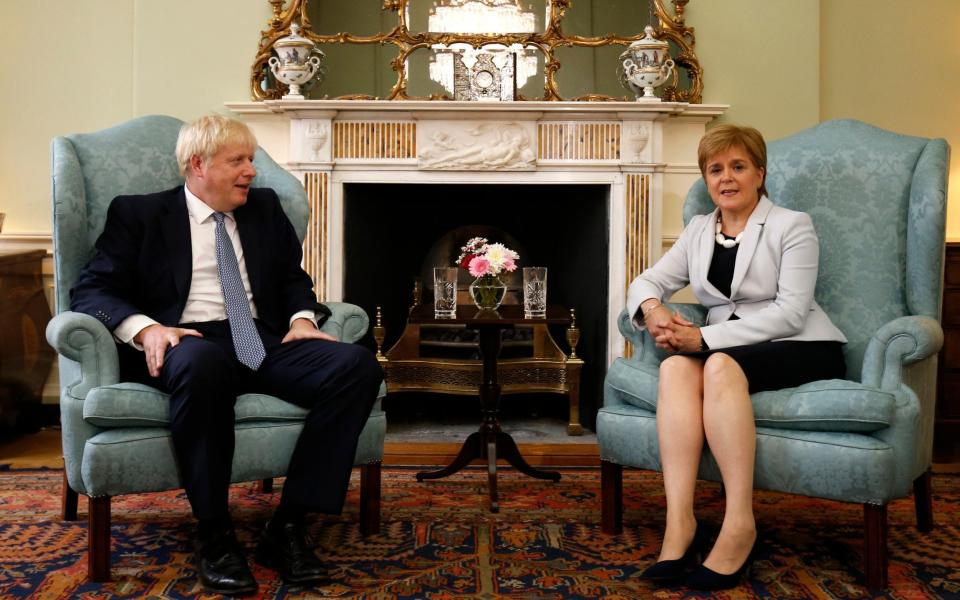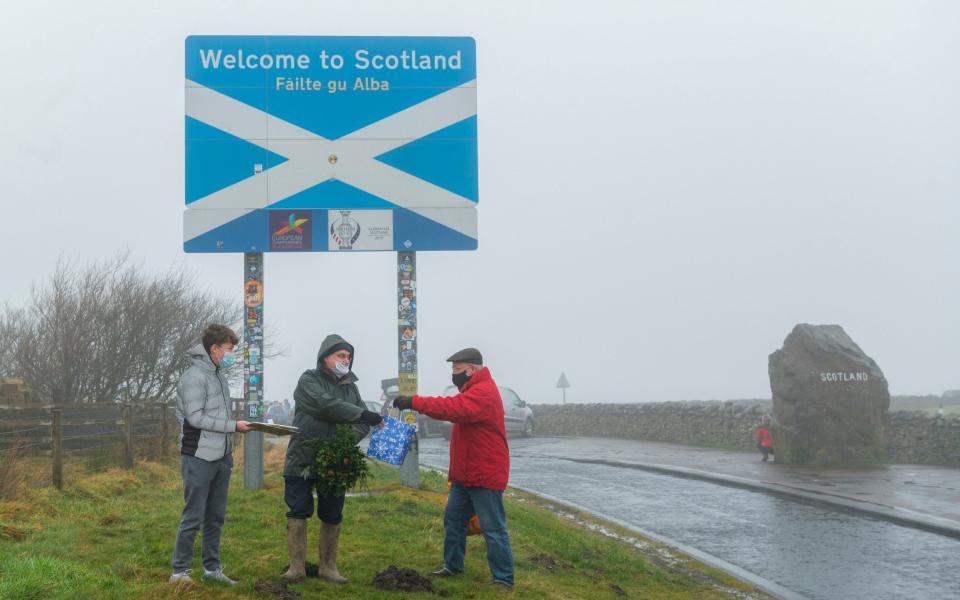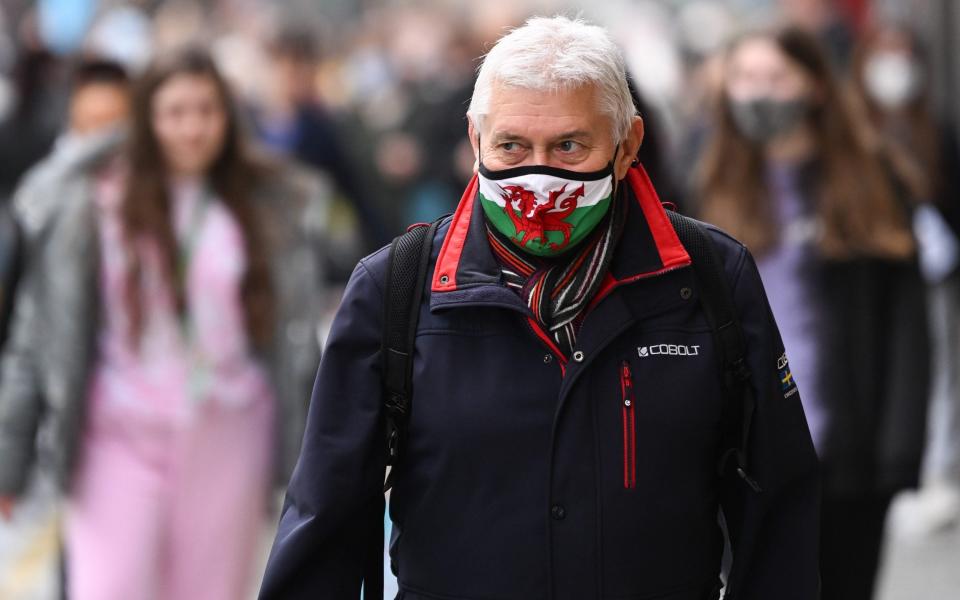How Scotland played politics with the pandemic – and lost

Nicola Sturgeon and, to a lesser extent, Mark Drakeford, the First Ministers respectively of Scotland and Wales, finally got the message this week that what Britain needs is not restriction, but as swift a return to normality as possible. Ms Sturgeon has at last ended the requirement for table service only in Scotland’s pubs and restaurants, and allowed nightclubs to reopen (“As long as nobody’s enjoying themselves,” said one wag), as well as deigning to allow normal football crowds to attend matches. She is also gingerly edging towards ending the advice – which, in Scotland’s case, many have been interpreted as an order – to work at home. But just in case anyone thinks she’s gone soft, she’s also got the Scottish Parliament to give her Government powers to bring back whatever restrictions she likes, any time she likes.
Sturgeon et al will never admit it, but the bulk of the population can see it for themselves – namely, that the steady, but finely judged easing of the rules designed to beat the Covid pandemic, as modelled by Boris Johnson, was better in the long run for the health, both personal and economic, of Britain than their preferred option of what’s been termed “lockdowns by stealth” in Scotland and Wales. As of this week, the methods adopted by what are known as the four nations of the United Kingdom at last began to look as if a concerted operation had been instigated by the leaders of England, Scotland, Wales and Northern Ireland, when the virus first raised its ugly head almost exactly two years ago. The truth, however, is sadly different.
Thanks to what’s called the “devolution settlement”, enacted by the Blair government in 1999, Scotland, Wales and Northern Ireland decided to go their own way. Needless to say, the politicians in charge of these devolved administrations insisted that they alone knew what was best for their own people and that, in spite of the fact that each had available to them essentially the same scientific and medical advice, they would fight Covid separately. And they’d win the battle better because they were doing it their way, ultra-draconian travel restrictions and all.
But from the very start of this war, it quickly began to look like what it really was: a straightforward ploy by the relevant national leaders to prove that they could do it better than Boris; and, furthermore, to use the battle against the pandemic for political advantage against the Tories in London. But two years on, it has undoubtedly backfired, with no material health benefits and dire economic consequences, given that the growth rate in Scotland and Wales is well below that in England.
In addition, it is difficult to see how an independent Scotland – still Sturgeon’s aim – could afford to fight another similar pandemic without depending on the strength of the UK Treasury.
As such, it demonstrated the futility of allowing devolved governments so much scope for restricting individual freedoms, all the while allowing them easy access to HM Treasury, and the British taxpayer’s cash register, for the funds to sustain their economies. And to benefit massively from the UK Government’s vaccine rollout programme, where it spent millions of pounds on developing, producing and distributing the jabs that won the war against the virus, much more effectively than First Minister Nicola Sturgeon’s PR stunts, or Wales’s Leftist leader Mark Drakeford’s determination to play to the audience and look tough in the Valleys.
There was little doubt in my mind that, from the outset, Sturgeon seemed overly attracted to the kind of zero-Covid policy adopted by New Zealand premier, Jacinda Ardern, which basically sought to wipe out the virus, no matter what. It seemed that she’d actually rather Scotland had been a complete island country like New Zealand, so that she really could pull up the drawbridge and keep everyone else out.
But Sturgeon’s Way also had a crucial refinement – namely, to accept all the plaudits for preventing the virus getting a grip in Scotland. If the economy crashed as a result… well, that would be all Boris Johnson’s fault.
In June 2020, the British Medical Journal reported her as saying that, as infection levels had fallen to such low levels, Scotland was close to eliminating the virus. On June 26, she was quoted as adding that it was “really significant” there had been no deaths in Scotland.
The same article, in the British Medical Journal, quoted Devi Sridar, professor of public health at Edinburgh University, and a key adviser to Sturgeon, saying that Scotland could be on track to eliminate coronavirus by the end of that summer.
Exactly one year later, the BBC reported that Scotland had topped Europe’s list of Covid hotspots, with the continent’s highest rates of infection reported in six Scottish health boards.
As we begin to emerge from the pandemic, Covid deaths and hospitalisations are in many cases worse in the devolved countries than in England, and it’s clear their economies could not have survived their lockdowns and restrictions without massive subsidies from British taxpayers.
In Scotland, for the last financial year, that totalled £8.6 billion, with more than £2.3 billion for business support, while another £440 million was pledged by Chancellor Rishi Sunak last month.
Sturgeon’s tactics worked exceptionally well in the early days of the pandemic. She would agree on a plan of action in talks with the other UK leaders, including Boris Johnson – only for her to then announce that plan for Scotland at least 24 hours before he did.
Fuelled by daily TV briefings – termed the “Zooms of Doom”, thanks to their sombre messages – delivered on a brand new BBC television channel that had been granted by an outgoing director general following incessant SNP pressure, Sturgeon’s popularity in Scotland soared. It was also remarkably high throughout other regions of Britain – until, that is, the vaccine rollout began.

The people of both Scotland and Wales appeared to go along with their leaders’ stern approach until it dawned on people that jabs, rather than severe restrictions, were key to getting Britain moving again.
But just to show that nobody could push them around, different – often entirely different – tactics were adopted by the governments and health authorities in Edinburgh, Cardiff and Belfast.
Throughout the two-year pandemic, the approaches by London and the other national capitals have been so marked, it has frequently looked as if they were going their own way for the sake of it. To enact regulations that went against Boris Johnson’s was almost a badge of pride.
This has led to the ridiculous situation, as recently as New Year’s Eve, when Scots piled on to trains for Newcastle, to celebrate Hogmanay in England, after it had been outlawed in Scotland by Sturgeon; and where Welsh merry-makers crossed the border en masse into pubs in Chester to escape Drakeford’s determination that nobody should enjoy themselves.
Time and time again, Sturgeon and Drakeford made it plain that, while they were happy to discuss things with their English counterparts, they were in total charge of what went on in their own backyards.
And yet, where was the benefit in this disunited kingdom? Last year, Glasgow had a higher overall Covid case rate than English cities such as Sheffield or Birmingham, despite enduring for nine months one of the harshest lockdowns in Europe.
Glaswegians were forbidden from mixing in each other’s homes, pubs were closed for indoor drinking, and no one was allowed to visit or leave the city without good reason.
There’s been frequent bickering between Sturgeon and the English authorities throughout. But a low point was Sturgeon’s assertion that Scotland’s record of fighting the infection was much better than England’s – a claim that led to her being slapped down in the summer of 2020 by the UK’s independent statistics watchdog for using dodgy data.
On one occasion, this led to Nationalist “vigilantes” staging a protest on the A1 and threatening a roadblock to turn back English motorists north of Berwick.
The situation with care homes has been especially bad in Scotland, where a report in August 2020 by Stirling University found that almost two-thirds (65 per cent) of Scotland’s 1,057 care homes had suspected or confirmed cases of Covid-19, compared with 44 per cent of homes in England, 37 per cent in Northern Ireland and 33 per cent in Wales. This occurred after Sturgeon had “emptied” the hospitals and sent people into care homes without being tested.
The Scottish Government’s most recent restrictions – which closed nightclubs and maintained strict social distancing rules in pubs and restaurants, as well as permitting table service only – were designed to combat the omicron variant, and were markedly stricter than those imposed in England. And yet they appear to have had little or no effect, with infection rates in both countries almost identical.
Furthermore, Sturgeon’s banning of football crowds or any gathering of more than 500 people was in contrast to her own senior adviser’s view who said there was less likelihood of people being infected by watching a match live in the open air than by watching the same match in a crowded pub.
Similarly, she persisted with her vaccine passport programme for nightclubs even after surveys suggested that they make little difference to infection rates; the effect on the hospitality sector, though, has been devastating. Stephen Montgomery owns and runs two hotels near the border with England and estimates that the Sturgeon shutdown and strict limits on numbers and social distancing over Christmas and New Year cost him a total of £60,000 in lost turnover, much of it caused by patrons holding their parties over the border into Cumbria.
“They can’t keep punishing us like this,” he says. “There should be a ‘central command post’ for the four countries with better planning and preparation.”
His theme was taken up by Allan Henderson, whose group runs 10 pubs and restaurants in Aberdeen, some of which only opened in the evenings because of Scottish Government restrictions. He claims: “It’s all about politics. They want to appear more cautious because, at the end of the day, they want to say: ‘We were better than England.’”
Dr Sandesh Gulhane, Conservative health spokesman in the Scottish Parliament, claims that Scotland had been “the most restrictive country in the UK”, and asks: “Why was Scotland always seven days behind England in easing the rules?”
Backing a general policy for the whole of the UK would have helped maintain the economy, he insists, adding: “We should take politics out of it by publishing all the data and then most people couldn’t complain. It’s easy for me as a doctor to say ‘let’s lock down’, but what if the economy crashes?”
Dr Gulhane is also struck by something an elderly patient told him during the pandemic – that, after two years of severe Covid restrictions, “I am alive, but I am not living. What’s the point?”

I don’t think Dr Gulhane was being overly cynical when he says that the two policies that were universally welcomed in these islands were the furlough scheme and “Eat Out to Help Out”, which both involved millions of pounds of subsidies from the Treasury.
David Mundell, the former Scottish secretary, says he couldn’t see any outcome whereby Scotland was better off for adopting its own methods against Covid than if it had stuck with a UK-wide approach, adding: “Why was it necessary? I remain to be convinced that it wasn’t just politics.”
In the Welsh Senedd, First Minister Drakeford was urged to apologise for the average £16,000 losses suffered by pubs thanks to his Christmas restrictions. He said it was the Conservatives who should apologise, for continually seeking to deny Welsh people “protection from the pandemic”.
However, Robin Millar, the Tory MP for Aberconwy, says that, as a result of the Labour administration’s policies, Wales has endured “more Covid cases, more hospitalisations, more deaths and more days in lockdown” than any other part of the United Kingdom.
Of Labour’s record, Millar says: “They have trashed the hospitality industry. They have applied their restrictions vigorously, but they have nothing to back it up. Why have they done this? In order to look more restrictive [than Westminster], of course.”
The main issue for the devolved authorities, which they finally appear to have grasped, has been that if they are to get their economies working properly again, they should no longer ignore the changes made in England, but copy them.
It may be impossible to calculate the massive extra costs incurred by the UK fighting Covid on four fronts, but an urgent review is clearly necessary if this ridiculous duplication – as well as stupid competition – between integral parts of the United Kingdom is not to happen again.
In the short term, if the devolved governments want to revive their capital cities, they must again get people going to work in their offices, factories and shops – something they’re still inexplicably dragging their feet on.
Putting political advantage ahead of the health and economic wellbeing of their citizens must never again be allowed to pay dividends.
Five ways the four nations divided during the pandemic
Luke Mintz

1. Face coverings
Scotland has generally been stricter than England on requiring the wearing of a mask in indoor public spaces. In the summer of 2020, Nicola Sturgeon made masks compulsory in shops and supermarkets, two weeks before England did the same. With the ending of its so-called “Plan B” regulations this week, England lifted all mask rules. Face coverings are not legally necessary anywhere, but remain an enforceable condition of travel on the London Underground and buses; and a requirement in healthcare settings such as GP surgeries, hospitals and care homes. Many of the major retailers including Tesco, Sainsburys, Lidl, Waitrose and John Lewis have asked staff and customers to keep wearing a face covering, although it is left to customers’ discretion in Marks & Spencer stores.
However, across Scotland, Wales and Northern Ireland, masks remain mandatory on all public transport (including stations and bus stops), and in indoor public settings, including in all shops and supermarkets; cafes, pubs and restaurants; churches and other places of worship, and in the workplace (including tradespeople working in people’s homes).
2. Working from home
England lifted its WFH advice – that everyone who could work from home should work from home – last July, but briefly reimposed it before Christmas, due to the increasing concerns about omicron. However, the WFH requirement ended on Monday. Next week, Holyrood will relax its own guidance, in favour of a more flexible “hybrid” system. The law was also relaxed in Wales yesterday, but guidance remains in place in Northern Ireland.
3. Hospitality
Scotland introduced new rules to tackle the omicron surge after Christmas, meaning nightclubs and other large events were closed, with a one-metre distancing rule introduced in indoor leisure settings. Wales and Northern Ireland introduced similar rules; England chose not to follow suit. Almost all of those post-Christmas rules have since been lifted.
4. Covid passports
Since October, Scots have had to show proof of vaccination or a negative lateral flow test to gain entry into nightclubs, sporting events and other large gatherings. England did not introduce a similar rule until December, after the emergence of omicron – and that requirement was lifted yesterday. However, the rules remain in place in Scotland, Wales and Northern Ireland.
5. Schools
From this week, masks have no longer been required in English schools. Ministers in England have generally mandated masks in school corridors and assemblies, but not inside classrooms (except for a few weeks earlier this month, when they were also required inside English classrooms). In Scotland, secondary school pupils are still required to wear face coverings, and to keep a one-metre distance from each other. Similar rules remain in place in Wales, where secondary school pupils have to test for Covid three times each week.

 Yahoo News
Yahoo News 
